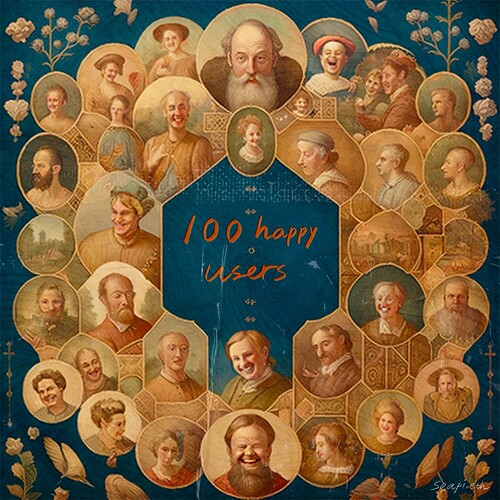Where would you like to see Honour by the end of the summer? What’s the next ridge you’d like to hit on this climb?
I see a golden thread here in your marketing explorations that I think if we pull, might become a nice Kernel Question for you.(That said, I’d like to offer you a clinic session on this, particularly since I have some product launch experience and I’m interested in learning web3 marketing. Stewards should get to clinic too  )
)
I’m also glad you’ve brought some attention back to Honour, and I’d still love to roll up my sleeves and help make it with you.
To start pulling the thread:
A lot of people find marketing banal, disingenuous or worse – but at this stage of a project, I find Money, in many ways, keeps us honest. Before you have the attention of the people you’re trying to help, marketing is a honing exercise in humility, empathy, and service.
Service, because we can adjust our concept and focus our effort on who sees enough value.
Empathy, because we must learn enough about people’s busy lives to know if what we’re doing makes the cut for them.
Humility, because we developing marketing teaches us where our amazing ideas might actually be irrelevant. And to succeed with new ideas, we have to learn from the skeletons on our path rather than plod on with hubris.
I think your deep, innate will to serve can make you a great marketer. It’s that willing to serve that becomes a willingness to ask, how can I serve you? You know I love the idea of Honour too, but it’s conceptually foreign to everyone. Their internal maps of their economic needs are going to the hardest part of the puzzle. So I think your willingness to serve needs to lead to you to “meet them where they are, not where you want them to be”. This means finding specific groups with specific contexts where Honour can serve them. It’s not so much an intellectual exercise as it is a long walk along the Ganges.
Since you’re part of those communities, you have a precious chance to casually ask them if they saw it or not, and if they did, you have a chance to understand why they didn’t respond. I’d use these answers to hone my attention. Is this an appropriate target audience? Does this meet a need of theirs that they perceive themselves and are actively making time to investigate? If so, am I reaching them in a way that’s congruent with their arbitrary expectations and standards for whatever this does for them?
There’s a concept of “premature scale” that I worry about here Most people new to marketing consider it to be mainly about broad awareness generation, banging drums, but really that’s a surface effect. It’s about finding the right people, and making sure that once you have their attention (“top of funnel”) that they will resonate enough to try (“convert”) and that we’ll be able to serve them so well that they stay (“retention”). The marketing terminology is cold and militaristic, but the principles are about empathy, humility and service. When they don’t do these things, especially at this early stage, it’s not about what we’re broadcasting, but if we’re listening to that “deafening silence” because that’s them communicating. In marketing terms, we build funnels “bottom-up” meaning that we start with finding who we can serve best, making sure we’re able to do it well enough for them to stick around, and then working our way up from there to how to describe what we do, and where to find similar people.
With the hacks you’re thinking about, I see some implicit targeting assumptions. The simple API targets devs, and asks “is the web3 interface a significant barrier to adoption?” Have you had feedback from web3 or web2 devs that indicates this? The convo hack asks, will people follow these strange steps in order to RSVP to an event they want to go to? I don’t think either of these focus on the bigger question – what will make people want to try this?
Back to humility, I think one of the hardest things to learn is to say “I don’t know” when that’s the case. That flips unknowns into questions. We don’t even need to have the answers within Kernel, just the pointers to useful analogs to investigate.
John Mullins helped a lot of new ideas get off the ground with his concept of Analogs, which was summarised well here:
Analogs are useful because it’s likely that whatever it is you’re doing has been been done before to some extent so you can use what other people have learned to formulate your own plan. This saves you time and resources because you can essentially borrow or steal approaches that have been proven to work or can serve as models for what you want to achieve. Many entrepreneurs have attempted or been successful with aspects of whatever enterprise you’re launching so why not learn from them and take advantage of their experience. Mullins and Komisar advise: “whatever you, don’t start from scratch.” A key examples in the book is Apple’s transition from PC hardware and software to consumer electronics and music distribution. Analogs for Apple were the Sony Walkman, the Rio and Napster.
Looking to previous failures and contrasting approaches is an instructive way to construct your approach. Antilogs can provide useful counterpoints or signposts for lurking danger. Antilogs and analogs help you avoid re-inventing the wheel and leapfrog into the next set of questions and uncertainties. Mixing and matching the best from those who came before you can give you the best of both worlds.
So we could frame Honour analogs in a few ways:
- Introducing novel point systems in games (this is kinda like a point system, and there must be some games we can learn from)
- Are there any ARGs that had viral mechanics? (this is kinda like a layered game on real life, with a viral mechanic: any product that causes new customers to sign up as a necessary side-effect of existing customers’ normal usage)
- Are there any defi protocols with some similarities in pricing effort? (What can be learned from Praise? Coordinape? Tip Party? )
- How do web3 projects launch without scarcity? (Any open NFT collections that tried to launch without the fomo power of artificial scarcity?)
- How have different defi protocols nestled their way in or found their happy corner? What shapes did their “wedges” take?
Would this “I don’t know” frame a useful Kernel Question for you that we can explore together? I can imagine picking 3-5 analogs from the above questions, and exploring these communities over the coming months. I’d expect that to surface more grounded hypothesis on who Honour might serve best at first, and how to reach them. I’d suggest we start with asking a few other fellows if they can think of any analogs, then “safariing” those communities to see how people described them (warts and all) and to keep us real, going to the founders and designers to ask them what really worked and didn’t.
This is only a suggestion – as you read this, does this feel like it pulls you in and fills you with intrigue? If yes, let’s do it. If not, I’ve missed the mark! If that’s so, please help me understand why  Maybe we could then back up to your broader goals and orient from there.
Maybe we could then back up to your broader goals and orient from there.






